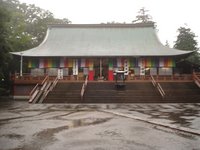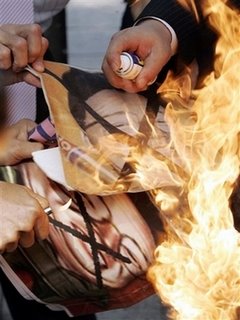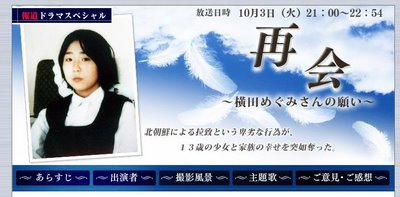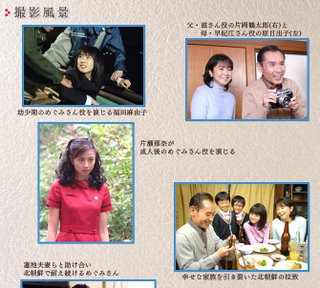You have gotta admit it. Prime Minister Abe Shinzō had a great month.
He gets himself elected party president in a landslide and picks a cabinet of his BFFs (Best Friends Forever) without having to cave in to the factions, the tribes or the raving lunatics.
He hands off all his burning issues to mind-numbing committees.
The leader of the main opposition party goes AWOL.
Minions toiling in the shadows finagle visits to Beijing and Seoul and face time with the Big Boys in both capitals. Abe receives the invites from his continental peers without having to surrender his NCND (If You Have To Ask You Can't Afford It) position on Yaskukuni.
Just as he is about to greet the Seoul Man, the Dear One has his scientists blow a chunk of their plutonium, or at least give it the old college try, making Abe's militant anti-DPRK posture look reasonable and prescient.
The UN Security Council grooves on sanctions, the Chinese banks cut off electronic transfers and the DPJ manages to lose both by-elections on October 22.
Sweet.
Come unto me, oh my encomiums! (Inside this Parenthesis, You'll See Something New! Encomium #1 and Encomium #2)
But, dangnabit, it turns out that there are SECOND months in prime ministerial careers.
And the first week of the second month of the Abe era turned out to be really crummy:
- a national scandal erupted in education that had nothing to do with either of two Abe educational obsessions: insufficient patriotism and more than sufficient sex ed (what the?).
Yes, it seems a number of elite high schools have been stiffing the government, filing false reports of students fulfilling national education requiremements . Instead of teaching the required subjects, the high schools, all of them known for the high percentage of graduates they have been sending on to quality universities, were caught teaching the content of the entrance exams .
Now the Gadfly at GlobalTalk21 points out a rural vs. urban disparity (all major economic and ethical issues run smack dab into this dichotomy one way or another) that partially exonerates the actions of the principals of the cheatin' schools.
I see no need for exoneration.
The dishonesty was in the Ministry of Education's regulations.
The decision to cheat was a rational one. The high schools had an interest in maintaining a high rate of production of successful candidates for elite universities. The parents wanted their children to be prepared for the university examinations, at the lowest possible cost. The children just wanted to win a space on the escalator of modern Japanese life--matriculation in a reputable university--as the crushing, traditional recruitment systems are reasserting themsleves in the companies made flush by the post-2001 economic recovery.
Rather than blindly follow the idiotic directives of the Ministry, the principals, the teachers and the parents conspired to promote the welfare of the children over the long term.
Calloo callay! Economic rationalism rules the day!
The more anal of commentators have been fluxommed at the lack of rage in the many public meetings being held the various affected schools.
"The schools principals lied; the children might not graduate! Where's the outrage?"
The schools were doing what the parents wanted, you (expletive deleted) rule-and-order-obsessed morons.
The real problem for Abe is that the miscreants in this scandal were the "good schools"--ones that are highly competitive, engage in practical teaching and submit themselves to rigorous, outside testing of their students.
Just the kind of schools parents would encourage their children to attend in the widely touted but impractical to the point of nonsense proposal to give out vouchers.
- On Tuesday, the Lionheart voiced his first criticism of his successor.
The subject was, unsurprisingly, the return of the postal exiles to the bossom of the LDP.
Aoki Mikio is convinced the exiles have a a major following in their home prefectures. This makes them dangerous political opponents. In Aoki's view, the sooner the exiles return the LDP, the sooner this threat is neutralized. Ozawa Ichirō has abetted Aoki's worries by sidling up to the exiles, declaring that the Democratic Party will cooperate with anyone willing to topple the LDP.
Abe, in order to woo Aoki and earn his support in the LDP presidential election, clearly promised to reintegrate the exiles at the earliest possible opportunity.
The exiles have so far cooperated, keeping Ozawa at arm's length. Twelve of the 13 exiles who retained their seats in the House of Representatives voted for Abe in the Diet election.
With the less-than-promising results of the October 22 by-elections, however, Nakagawa Hidenao--the architect of next year's overall elections strategy--is getting cold feet over the deal. The loss in Chiba during the summer and the LDP's dependence on the Komeitō vote on Sunday last has him thinking that maybe, just maybe, the LDP cannot just do whatever it wants and still win elections.
The Lionheart was much more blunt about the impact of the return of the exiled:
"If those dependent on the post offices come back, we'll lose in the House of Councillors election."
Surprise! A lot of the Koizumi Children agree.
True, it would be great for Noda Seiko to be back in the LDP, providing a counterbalance to the ridiculous Takaichi Sanae and the Sisters of Opportunism (Katayama Satsuki and Satō Yukari).
But God, the thought of three quarters of the Ugliest Golf Foursome in the History of the Sport

back in the party gives me the creeps too.
- All for one and everyone has it out for the hosakan.
It was also clear last week that the bureaucrats will not be taking the appointment of Koike Yuriko and Yamatani Eriko lying down. While Abe may want to concentrate policy generation inside the kantei, the ministries have made clear they will not countenance commissions and councils that do anything but their traditional function of generating Good Ideas That Will Never Be Realized. The Education Ministry even shoved Ibuki Bunmei in front of the microphone to declare his ministry will not necessarily follow the recommendations of Yamatani's Education Reconstruction Council, which met for the first time on the 25th.
Way to show your support for the Prime Minister, Ibuki-san!
To make matters worse, Yamatani was sent on a fool's errand last week. Someone thought it necessary that she investigate firsthand an egregious case of bullying, incited by a teacher, that drove a child to suicide.
Unfortunately, while Yamatani can play the prude or the scold, she has no real warmth in her repetoire to bestow or deny as the occasion warrants. When confronted by the school's paucity of remorse she could only utter dumbstruck promises to change...uh..something. Her deer-stuck-in-the-headlights-look indicated she had never entertained the possibility that her job would be anything more that driving anatomically correct dolls and incompetent teachers out of the classroom.
Discipline and social rectitude, she seemed to be realizing for the first time, can be two-edged swords.














